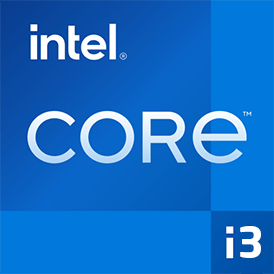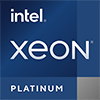
Intel Core i3-8109U Benchmark, Test and specs
Last updated:
The Intel Core i3-8109U is a 2 core processor. It can handle 4 threads simultaneously and was introduced in Q4/2017. The Intel Core i3-8109U is based on the 8. generation of the Intel Core i3 series and requires a mainboard with the socket BGA 1528. The Intel Core i3-8109U scores 881 points with one CPU core in the Geekbench 5 benchmark. When using all CPU cores, the result is 2,021 points.

| Name: | Intel Core i3-8109U |
|---|---|
| Family: | Intel Core i3 (205) |
| CPU group: | Intel Core i 8000U (8) |
| Architecture: | Coffee Lake U |
| Segment: | Mobile |
| Generation: | 8 |
| Predecessor: | -- |
| Successor: | -- |
CPU Cores and Base Frequency
The 2 CPU cores of the Intel Core i3-8109U clock with 3.00 GHz (3.60 GHz). The number of CPU cores and the clock frequency of the processor are largely responsible for the overall performance.
| CPU Cores / Threads: | 2 / 4 |
|---|---|
| Core architecture: | normal |
| Cores: | 2x |
| Hyperthreading / SMT: | Yes |
|---|---|
| Overclocking: | No |
| Frequency: | 3.00 GHz |
| Turbo Frequency (1 Core): | 3.60 GHz |
| Turbo Frequency (2 Cores): | 3.20 GHz |
Internal Graphics
With the Intel Iris Plus Graphics 655, the Intel Core i3-8109U has an build in graphic solution. It has 48 SM processors, which have a total of 384 texture shaders. The iGPU not only enables games, but also significantly accelerates video playback.
| GPU name: | Intel Iris Plus Graphics 655 |
|---|---|
| GPU frequency: | 0.30 GHz |
| GPU (Turbo): | 1.05 GHz |
| Compute units: | 48 |
| Shader: | 384 |
| Hardware Raytracing: | No |
| Release date: | Q4/2017 |
| Max. displays: | 3 |
|---|---|
| Generation: | 9.5 |
| Direct X: | 12 |
| Technology: | 14 nm |
| Max. GPU Memory: | 32 GB |
| Frame Generation: | No |
Hardware codec support
Processors that have an integrated graphics can play videos faster and more efficiently. This can have a positive effect on the battery life of notebooks, for example.
| h265 / HEVC (8 bit): | Decode / Encode |
|---|---|
| h265 / HEVC (10 bit): | Decode / Encode |
| h264: | Decode / Encode |
| VP8: | Decode / Encode |
| VP9: | Decode / Encode |
| AV1: | No |
|---|---|
| AVC: | Decode / Encode |
| VC-1: | Decode |
| JPEG: | Decode / Encode |
Memory & PCIeThe Intel Core i3-8109U supports up to 32 GB memory in up to 2 (Dual Channel) memory channels. This results in a maximum memory bandwidth of 38.4 GB/s. |
|
| Memory type: | Memory bandwidth: |
|---|---|
| LPDDR3-2133 DDR4-2400 | 34.2 GB/s 38.4 GB/s |
| Max. Memory: | 32 GB |
| Memory channels: | 2 (Dual Channel) |
| ECC: | Yes |
| PCIe: | 3.0 x 16 |
| PCIe Bandwidth: | 15.8 GB/s |
Thermal ManagementWith the TDP, the processor manufacturer specifies the cooling solution required for the processor. The Intel Core i3-8109U has a TDP of 28 W. |
|
|---|---|
| TDP (PL1 / PBP): | 28 W |
| TDP (PL2): | -- |
| TDP up: | -- |
| TDP down: | 20 W |
| Tjunction max.: | 100 °C |
Technical details
The Intel Core i3-8109U has a 4.00 MB large cache. The processor is manufactured in 14 nm. Modern production increases the efficiency of the processor.
| Technology: | 14 nm |
|---|---|
| Chip design: | Monolithic |
| Socket: | BGA 1528 |
| L2-Cache: | -- |
| L3-Cache: | 4.00 MB |
| AES-NI: | Yes |
| Operating systems: | Windows 10, Windows 11, Linux |
| Virtualization: | VT-x, VT-x EPT, VT-d |
|---|---|
| Instruction set (ISA): | x86-64 (64 bit) |
| ISA extensions: | SSE4.1, SSE4.2, AVX2 |
| Release date: | Q4/2017 |
| Release price: | -- |
| Part Number: | -- |
| Documents: | Technical data sheet |
Rate this processor
Benchmark results

The benchmark results for the Intel Core i3-8109U have been carefully checked by us. We only publish benchmark results that have been created by us or that have been submitted by a visitor and then checked by a team member. All results are based on and fullfill our benchmark guidelines.
Screenshots:
Screenshots:
- Cinebench R15 on Intel NUC8i3BEH (8GB DDR4-2400), Windows 10
- AIDA64 CPUID on Intel NUC8i3BEH (8GB DDR4-2400), Windows 10
- AIDA64 iGPU Benchmark on Intel NUC8i3BEH (8GB DDR4-2400), Windows 10
- AIDA64 Cache & Memory Benchmark on Intel NUC8i3BEH (8GB DDR4-2400), Windows 10
Cinebench 2024 (Single-Core)
The Cinebench 2024 benchmark is based on the Redshift rendering engine, which is also used in Maxon's 3D program Cinema 4D. The benchmark runs are each 10 minutes long to test whether the processor is limited by its heat generation.

|
AMD Ryzen 7 1700
8C 16T @ 3.70 GHz |
||

|
Valve Steam Deck (AMD Custom APU 0405)
4C 8T @ 3.50 GHz |
||

|
Intel Core i5-6500
4C 4T @ 3.60 GHz |
||
|
|
Intel Core i3-8109U
2C 4T @ 3.60 GHz |
||

|
Intel Core i5-8350U
4C 8T @ 3.60 GHz |
||

|
Intel Core i7-5960X
8C 16T @ 3.50 GHz |
||

|
AMD Ryzen 3 3200G
4C 4T @ 4.00 GHz |
||
Cinebench 2024 (Multi-Core)
The Multi-Core test of the Cinebench 2024 benchmark uses all cpu cores to render using the Redshift rendering engine, which is also used in Maxons Cinema 4D. The benchmark run is 10 minutes long to test whether the processor is limited by its heat generation.

|
Intel Pentium Gold 7505
2C 4T @ 3.50 GHz |
||

|
AMD Athlon 3000G
2C 4T @ 3.50 GHz |
||

|
Intel Core i5-6300U
2C 4T @ 3.00 GHz |
||
|
|
Intel Core i3-8109U
2C 4T @ 3.60 GHz |
||

|
Intel Processor N200
4C 4T @ 3.70 GHz |
||

|
Intel Core i5-5200U
2C 4T @ 2.70 GHz |
||

|
Intel Core i5-4200U
2C 4T @ 2.60 GHz |
||
Geekbench 5, 64bit (Single-Core)
Geekbench 5 is a cross plattform benchmark that heavily uses the systems memory. A fast memory will push the result a lot. The single-core test only uses one CPU core, the amount of cores or hyperthreading ability doesn't count.

|
Intel Xeon E5-2660 v3
10C 20T @ 3.30 GHz |
||

|
Intel Core i7-7700HQ
4C 8T @ 3.80 GHz |
||

|
Intel Xeon Gold 5115
10C 20T @ 2.80 GHz |
||
|
|
Intel Core i3-8109U
2C 4T @ 3.60 GHz |
||

|
Intel Xeon Silver 4208
8C 16T @ 3.20 GHz |
||

|
Intel Core i5-4670
4C 4T @ 3.80 GHz |
||

|
Intel Core i5-L16G7
5C 5T @ 3.00 GHz |
||
Geekbench 5, 64bit (Multi-Core)
Geekbench 5 is a cross plattform benchmark that heavily uses the systems memory. A fast memory will push the result a lot. The multi-core test involves all CPU cores and taks a big advantage of hyperthreading.

|
Intel Pentium G4560
2C 4T @ 3.50 GHz |
||

|
Intel Core i7-2710QE
4C 8T @ 2.10 GHz |
||

|
AMD Athlon 220GE
2C 4T @ 3.40 GHz |
||
|
|
Intel Core i3-8109U
2C 4T @ 3.20 GHz |
||

|
MediaTek MT8188J
8C 8T @ 2.20 GHz |
||

|
Intel Core i5-7260U
2C 4T @ 3.40 GHz |
||

|
AMD Athlon Gold 7220C
2C 4T @ 3.00 GHz |
||
Geekbench 6 (Single-Core)
Geekbench 6 is a benchmark for modern computers, notebooks and smartphones. What is new is an optimized utilization of newer CPU architectures, e.g. based on the big.LITTLE concept and combining CPU cores of different sizes. The single-core benchmark only evaluates the performance of the fastest CPU core, the number of CPU cores in a processor is irrelevant here.

|
Intel Xeon Gold 6142
16C 32T @ 3.70 GHz |
||

|
Intel Core i5-6500
4C 4T @ 3.60 GHz |
||

|
Intel Core i7-4790T
4C 8T @ 3.90 GHz |
||
|
|
Intel Core i3-8109U
2C 4T @ 3.60 GHz |
||

|
AMD Ryzen 5 PRO 3400G
4C 8T @ 4.20 GHz |
||

|
Intel Core i5-4690S
4C 4T @ 3.90 GHz |
||

|
AMD Athlon Gold 7220U
2C 4T @ 3.70 GHz |
||
Geekbench 6 (Multi-Core)
Geekbench 6 is a benchmark for modern computers, notebooks and smartphones. What is new is an optimized utilization of newer CPU architectures, e.g. based on the big.LITTLE concept and combining CPU cores of different sizes. The multi-core benchmark evaluates the performance of all of the processor's CPU cores. Virtual thread improvements such as AMD SMT or Intel's Hyper-Threading have a positive impact on the benchmark result.

|
Qualcomm Snapdragon 780G
8C 8T @ 2.40 GHz |
||

|
Intel Core i5-7287U
2C 4T @ 3.70 GHz |
||

|
Intel Core i7-3770K
4C 8T @ 3.90 GHz |
||
|
|
Intel Core i3-8109U
2C 4T @ 3.20 GHz |
||

|
Intel Core i7-3740QM
4C 8T @ 2.70 GHz |
||

|
Intel Core i7-3820QM
4C 8T @ 2.70 GHz |
||

|
MediaTek Dimensity 7050
8C 8T @ 2.60 GHz |
||
Cinebench R20 (Single-Core)
Cinebench R20 is the successor of Cinebench R15 and is also based on the Cinema 4 Suite. Cinema 4 is a worldwide used software to create 3D forms. The single-core test only uses one CPU core, the amount of cores or hyperthreading ability doesn't count.

|
AMD Ryzen 7 3700U
4C 8T @ 4.00 GHz |
||

|
AMD Ryzen 7 3750H
4C 8T @ 4.00 GHz |
||

|
AMD Ryzen 7 3780U
4C 8T @ 4.00 GHz |
||
|
|
Intel Core i3-8109U
2C 4T @ 3.60 GHz |
||

|
Intel Core i5-10400T
6C 12T @ 3.60 GHz |
||

|
Intel Xeon Platinum 8256
4C 8T @ 3.90 GHz |
||

|
Intel Xeon Platinum 8260
24C 48T @ 3.90 GHz |
||
Cinebench R20 (Multi-Core)
Cinebench R20 is the successor of Cinebench R15 and is also based on the Cinema 4 Suite. Cinema 4 is a worldwide used software to create 3D forms. The multi-core test involves all CPU cores and taks a big advantage of hyperthreading.

|
AMD Ryzen 7 2700U
4C 8T @ 3.40 GHz |
||

|
Intel Core i5-4590T
4C 4T @ 2.50 GHz |
||

|
Intel Pentium Silver N6005
4C 4T @ 3.00 GHz |
||
|
|
Intel Core i3-8109U
2C 4T @ 3.20 GHz |
||

|
Intel Pentium Gold G5500
2C 4T @ 3.80 GHz |
||

|
Intel Core i3-6100
2C 4T @ 3.70 GHz |
||

|
AMD Phenom II X6 1055T
6C 6T @ 3.30 GHz |
||
iGPU - FP32 Performance (Single-precision GFLOPS)
The theoretical computing performance of the internal graphics unit of the processor with simple accuracy (32 bit) in GFLOPS. GFLOPS indicates how many billion floating point operations the iGPU can perform per second.

|
Intel Core i5-5350H
Intel Iris Pro Graphics 6200 @ 1.05 GHz |
||

|
Intel Core i5-5575R
Intel Iris Pro Graphics 6200 @ 1.05 GHz |
||

|
Intel Core i7-5750HQ
Intel Iris Pro Graphics 6200 @ 1.05 GHz |
||
|
|
Intel Core i3-8109U
Intel Iris Plus Graphics 655 @ 1.05 GHz |
||

|
Intel Core i5-5257U
Intel Iris Graphics 6100 @ 1.05 GHz |
||

|
Intel Core i5-4570R
Intel Iris Pro Graphics 5200 @ 1.25 GHz |
||

|
Intel Core i5-14500HX
Intel UHD Graphics 13th Gen (32 EU) @ 1.55 GHz |
||
Estimated results for PassMark CPU Mark
Some of the CPUs listed below have been benchmarked by CPU-monkey. However the majority of CPUs have not been tested and the results have been estimated by a CPU-monkey’s secret proprietary formula. As such they do not accurately reflect the actual Passmark CPU mark values and are not endorsed by PassMark Software Pty Ltd.

|
Intel Atom C3958
16C 16T @ 2.00 GHz |
||

|
Intel Celeron J6413
4C 4T @ 2.60 GHz |
||

|
Intel Pentium Gold G6405
2C 4T @ 4.10 GHz |
||
|
|
Intel Core i3-8109U
2C 4T @ 3.20 GHz |
||

|
Intel Core i5-3350P
4C 4T @ 3.10 GHz |
||

|
Intel Core i5-4430S
4C 4T @ 2.70 GHz |
||

|
Intel Core i7-7567U
2C 4T @ 3.90 GHz |
||
Cinebench R15 (Single-Core)
Cinebench R15 is the successor of Cinebench 11.5 and is also based on the Cinema 4 Suite. Cinema 4 is a worldwide used software to create 3D forms. The single-core test only uses one CPU core, the amount of cores or hyperthreading ability doesn't count.

|
Intel Core i7-5775R
4C 8T @ 3.80 GHz |
||

|
Intel Core i7-6700T
4C 8T @ 3.60 GHz |
||

|
Intel Xeon E5-2687W v2
8C 16T @ 4.00 GHz |
||
|
|
Intel Core i3-8109U
2C 4T @ 3.60 GHz |
||

|
Intel Core i7-4980HQ
4C 8T @ 4.00 GHz |
||

|
Intel Core i5-7360U
2C 4T @ 3.60 GHz |
||

|
Intel Core i7-6567U
2C 4T @ 3.60 GHz |
||
Cinebench R15 (Multi-Core)
Cinebench R15 is the successor of Cinebench 11.5 and is also based on the Cinema 4 Suite. Cinema 4 is a worldwide used software to create 3D forms. The multi-core test involves all CPU cores and taks a big advantage of hyperthreading.

|
Intel Core i5-7360U
2C 4T @ 3.60 GHz |
||

|
Intel Core i3-7300T
2C 4T @ 3.50 GHz |
||

|
Intel Pentium G4560
2C 4T @ 3.50 GHz |
||
|
|
Intel Core i3-8109U
2C 4T @ 3.20 GHz |
||

|
AMD Athlon PRO 300GE
2C 4T @ 3.40 GHz |
||

|
AMD Athlon 220GE
2C 4T @ 3.40 GHz |
||

|
Intel Core i5-7267U
2C 4T @ 3.50 GHz |
||
Benchmarks

Cinebench 2024 (SC)
272 entries
272 entries

Cinebench 2024 (MC)
271 entries
271 entries

Geekbench 5 (SC)
2,488 entries
2,488 entries

Geekbench 5 (MC)
2,461 entries
2,461 entries

Geekbench 6 (SC)
1,755 entries
1,755 entries

Geekbench 6 (MC)
1,703 entries
1,703 entries

Cinebench R20 (SC)
656 entries
656 entries

Cinebench R20 (MC)
604 entries
604 entries

FP32 SP (iGPU)
2,042 entries
2,042 entries

3DMark Timespy (iGPU)
516 entries
516 entries

PassMark CPU-Mark
2,392 entries
2,392 entries

Cinebench R15 (SC)
1,106 entries
1,106 entries

Cinebench R15 (MC)
1,101 entries
1,101 entries

Geekbench 3 (SC)
942 entries
942 entries

Geekbench 3 (MC)
938 entries
938 entries

Cinebench R11.5 (SC)
825 entries
825 entries

Cinebench R11.5 (MC)
836 entries
836 entries
Popular comparisons
back to index




